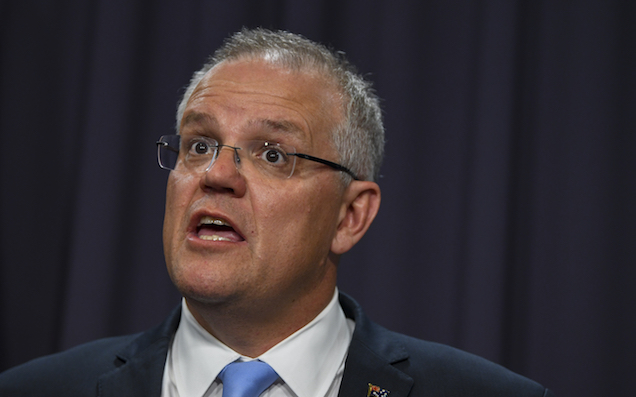
Prime minister Scott Morrison has announced that the government already had “contingency” plans in place for this eventuality after a historic loss in the House of Representatives over a bill allowing for the medical transfer of asylum seekers to Australia.
The bill passed 75-74, with the government voted down thanks to a coalition of Labor, the Greens, and every cross-bencher except for — surprise — Bob Katter. According to the big-time nerds at the House of Representatives, it is the first time since 1941 that a government has lost a legislative vote in the House, and the first time since 1929 that it has happened with a substantive piece of legislation.
In a press conference after the vote, Morrison accused Labor leader Bill Shorten of inviting an influx of boat arrivals by passing this legislation, saying that “every arrival, every risk is on his head“. Morrison said that it was now the government’s job to deal with the “risk and the threat” created by the bill:
My job now is to work with our border protection and security agencies to do everything in my power to mitigate the damaging impact of what Labor have done tonight.
The Minister for Home Affairs and Minister for Immigration, Citizenship and Multicultural Affairs are meeting now with our Border Protection Command to work through the contingency planning that we have been putting in place for this outcome.
This outcome was not unexpected to me and, as a result, we have been putting contingency planning in place and I’ll have more announcements to make about the actions and decisions the Government will be taking to address now the risk and the threat that Labor and Bill Shorten have created.
Appearing on 7.30, Minister for Home Affairs Peter Dutton told Leigh Sales that the legislation opened up the option for people convicted of child sex offences and ‘other serious crimes’ to come to Australia from Manus and Nauru, but would not provide figures on how many people fitting that description are in detention.
.@PeterDutton_MP: Under the arrangements that Mr Shorten and The Greens passed, we have people that can come to our country from Manus or Nauru. People that have been charged with child sex offences. Child charged or allegations around serious offences including murder. #auspol pic.twitter.com/EeBA4jQ1Ke
— abc730 (@abc730) February 12, 2019
Conversely, human rights organisations have praised the success of the vote, releasing a joint statement after it passed. From Kelly Nicholls of the Refugee Council of Australia:
The safety of lives must always come first. Doctors have been ignored for too long. People have died as a result. Pregnant women with complications have had to wait dangerously long to receive the treatment they need. Rape survivors have to had to have traumatic late-term abortions due to government blocks. This bill changes the response to medical emergencies in offshore detention on Manus Island and Nauru.
From GetUp! human rights director Shen Narayanasamy:
This is a watershed moment in Australian political history – because the 15-year trajectory of cruelty towards asylum seekers has ended. We thank the millions of people across this country who have fought so long for this victory and remember those people who have died in our name, that this bill would have saved.
Executive director with the Human Rights Law Centre Hugh de Kretser:
Today we saw politics at its best with MPs across the floor working together to ensure a humane solution. The current medical transfer system is broken. People needing urgent medical assistance have severely deteriorated and even died. Notably, the coroner found that the death of young man Hamid Khazaei was caused by medical failure and delays. We need to stop risking lives. We now call on the Senate to pass this bill as soon as possible.
The bill will now head back to the Senate for a further vote on the amendments, where they are expected to pass.
“There is no bipartisanship on his issue [border protection],” Prime Minister @ScottMorrisonMP #auspol #abc730 pic.twitter.com/lrFEmZOeJs
— abc730 (@abc730) February 12, 2019



